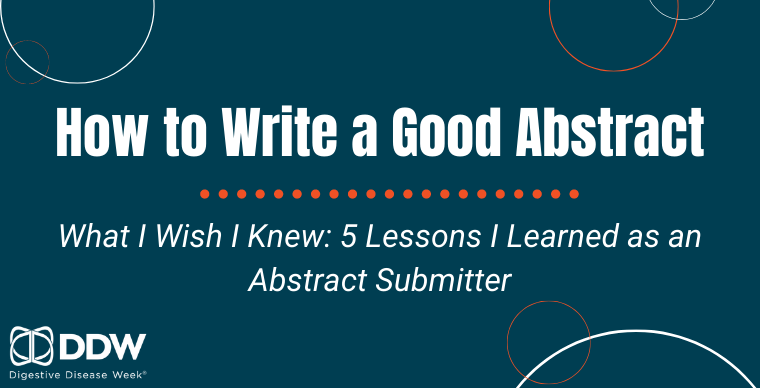
Digestive Disease Week® (DDW) 2021 abstract submission is now open. To help you craft the perfect abstract, we’re teaming up with experienced submitters to create a series of blog posts with advice and tips. Below, Dhruvil Radadiya, MD, publishes the first in this series by sharing five things that he wishes he knew before submitting his first abstract to DDW.
[icon type=”vector” icon=”momizat-icon-star” size=”25″ hover_animation=”border_increase” ]Know the Submission Deadline
Often, we are immersed in our research projects with no plan of how or when we will present it. Knowing deadlines makes us more organized and delegate tasks to our team if needed. The deadline for DDW 2021 abstract submission is Thursday, Dec. 3, 2020, at 21:00 Eastern time (UTC –5) or 9 p.m. EST. I advise you to mark this deadline on your calendar so you don’t forget it.
[iconbox title=”” title_align=”left” content_align=”left” layout=”boxed” border=”#000000″ align=”left” type=”vector” icon=”fa-icon-lightbulb” icon_align_to=”content” size=”32″ ]Did you know? DDW outlined 2021 key dates in this article with invitations to download to your personal device.[/iconbox][icon type=”vector” icon=”momizat-icon-star” size=”25″ hover_animation=”border_increase” ]Start the Submission Process Early
Even if you’re not ready to submit or your project is still going on but you expect it to be completed before the deadline, it’s helpful to get started in the submission site. Abstract submission goes beyond just submitting your abstract. You will also be asked to add authors’ names, institutions, email addresses and conflict of interest statements, which can be painful on deadline day, particularly if the author list is big. I personally prefer to create a “shell” once the submission period begins, and once I am ready, I upload the text, images and associated charts.
[icon type=”vector” icon=”momizat-icon-star” size=”25″ hover_animation=”border_increase” ]Review the Abstract Submission Guidelines
Once you create a shell, you will have time to work on the actual writing part of the abstract. But before you start writing, always review the submission guidelines regarding structure, word limit and table/figure limits. Then, create an outline of what you want to present and how much you want to present.
[iconbox title=”” title_align=”left” content_align=”left” layout=”boxed” border=”#000000″ align=”left” type=”vector” icon=”fa-icon-lightbulb” icon_align_to=”box” size=”32″ ]Did you know? There are several tutorials uploaded to the DDW YouTube channel. This one shows you how to convert tables into images.[/iconbox][icon type=”vector” icon=”momizat-icon-star” size=”25″ hover_animation=”border_increase” ]Revise Your Initial Draft
Once you are done writing the initial draft, follow the suggestions below for revising the abstract.
- Cut any clutter to match the word limit. Make it concise yet informative. Do not include every finding in your abstract — focus on the main points you want to get across through the audience.
- Ask your mentors or co-authors for help to review your abstract and use software to check the grammatical accuracy if English is your second language.
- Ensure your conclusion does not go beyond what your results show, and vice versa, ensure you are stressing your key findings enough. In general, people oversell their results, which often leads to rejection by reviewers.
[icon type=”vector” icon=”momizat-icon-star” size=”25″ hover_animation=”border_increase” ]Avoid a Last-Minute Submission
In the heat of the moment, there is a chance you may miss some minor things, such as grammar mistakes, spelling mistakes or a mismatch between table numbers and main text numbers. Additionally, on the deadline, many authors will be submitting their work at the same time, causing traffic and potentially slower website response times. Don’t take any chances with running out of time. Ideally, submit at least a day or two before the deadline, and send a copy of the final submission to co-authors to recheck it.
[iconbox title=”” title_align=”left” content_align=”left” layout=”boxed” border=”#000000″ align=”left” type=”vector” icon=”fa-icon-lightbulb” icon_align_to=”box” size=”32″ ]Did you know? You can make edits to your abstract up until the deadline by logging into the submission site.[/iconbox]


